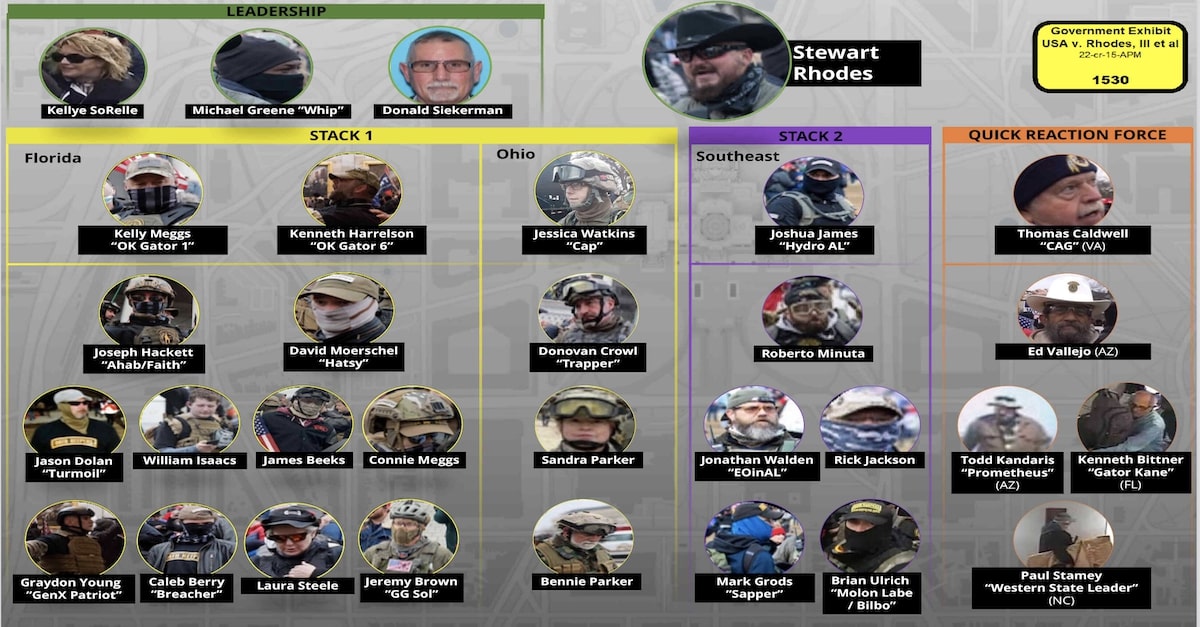
Prosecutors introduced this flow chart of Oath Keepers leadership during the seditious conspiracy trial of the group’s high-ranking members. Michael Greene can be seen in the top row, at the center of the box marked “LEADERSHIP.”
Listen to a recap of the Oath Keepers trial, with once-secret tapes shown to a jury, below:
The first time Iraq War veteran Michael Greene encountered the Oath Keepers at a gun show, he remembered looking at them with a wary eye. The members he saw were standing near white supremacists, and Greene is a Black man.
On Wednesday, Greene told a federal jury how the former second-in-command for Stewart Rhodes made him change his mind about the group, enough to make him eventually become its “ops” leader for Jan. 6.
That ex-No. 2 for Rhodes, Greg McWhirter, was reported by the New York Times to have been an FBI informant on the Oath Keepers for months before the attack on the U.S. Capitol. McWhirter, a former deputy sheriff, is also Black.
“I told him I thought they were racist,” Greene said.
“No, man, not at all,” McWhirter replied, according to Greene. “That’s not how it is.”
Branded an anti-government group by extremism watchdogs, the Oath Keepers came into focus during the Jan. 6 Committee’s hearings when their former national spokesman Jason Van Tatenhove described their drifting to the “alt-right,” with “white nationalist” and “straight-up racist” tendencies. Greene sharply denied that in an interview with the liberal Mother Jones magazine, which first unmasked him — and his alter egos Michael Simmons and “Whip” — a little more than a year ago as the group’s operations leader.
The tale of Greene’s introduction to the Oath Keepers fell just the morning after the Times bombshell shook up the proceedings. In a sealed motion inadvertently filed publicly, prosecutors blamed the report on a possible violation of a protective order by the defense and claimed it could have put McWhirter’s safety in peril. The motion appear to confirm the Times reporting that McWhirter suffered a heart attack while en route to Washington, D.C., to testify.
“The government asks the Court to take these steps because of the substantial security and health concerns triggered by the premature leak of Mr. McWhirter’s status as a CHS,” Assistant U.S. Attorney Kathryn Rakoczy wrote, using a common law enforcement abbreviation for a confidential human source. “Even prior to this disclosure to the NY Times, Mr. McWhirter conveyed to the government tremendous anxiety about his status as a confidential informant being publicly revealed.”
Before Greene took the stand, trial proceedings opened for the day in a sealed courtroom. It is unclear when or if McWhirter will testify as a defense witness.
For his part, Greene took a risk in testifying because he separately faces five charges in connection with Jan. 6. He, like other members of the Oath Keepers, denies that storming the U.S. Capitol, blocking the certification of the election, and keeping former President Donald Trump in office was the mission that day. Instead, Greene claims, the Oath Keepers were simply security detail to Trump allies like Roger Stone and Michael Flynn. Their mission was threefold: protection of the stage, protection of the VIPs, and escorging speakers to their vehicles, he said.
Greene also denied that there was an implicit plan to storm the Capitol and block the certification, a plan of action he claimed would go against the group’s military discipline.
“Nothing is implied in the military,” said Greene, who followed up his combat service in Iraq with a stint in the private security company Academi, formerly known as Blackwater. “Everything has a plan in the military.”
During contentious cross-examination, Assistant U.S. Attorney Jeffrey Nestler tried to undermine that position. Nestler noted that Greene “sometimes” participated in conferences on the platform GoToMeeting, but Greene said he did so only twice, adding he’s not formally a member of the Oath Keepers.
Pointing out Greene made money from the group, Nestler said: “You’re a mercenary. You come in and get the money.”
Bristling, Greene replied: “That’s not what a mercenary is,” adding that mercenaries fight wars for other countries. The prosecutor suggested that Greene was paid to fight Rhodes’s war, but Greene said that Jan. 6 wasn’t a war — it was a riot.
“It’s no different than the antifa and BLM riots,” said Greene, using the shorthand for anti-fascists activists and the Black Lives Matter movement.
Nestler then rolled tape on a GoToMeeting recording of Rhodes telling participants that they should be “willing to die.”
Greene responded that this rhetoric was just “how Stewart talks.”
“Oh, we gotta fight to preserve this country,” he scoffed, imitating Rhodes and comparing him to the old guy at the barbershop.”
When Nestler asked if the old guy at the barbershop rioted at the Capitol, Greene answered in the affirmative, and he said that his co-defendants aren’t young.
“I’m on the docket with two old people,” Greene said. “They’re old. They’re old as shit.”
The prosecutor showed other communications suggesting the martial rhetoric wasn’t just bluster. In one message exchange with an Oath Keepers member, Greene wrote: “Stewart believes we[‘]re on the brink of a Civil War.” He added later: “I can see how it would happen.”
On Jan. 4, 2021, Greene asked the same person: “Do you want me to bring your upper?” He confirmed that he had been referring to the firearm component.